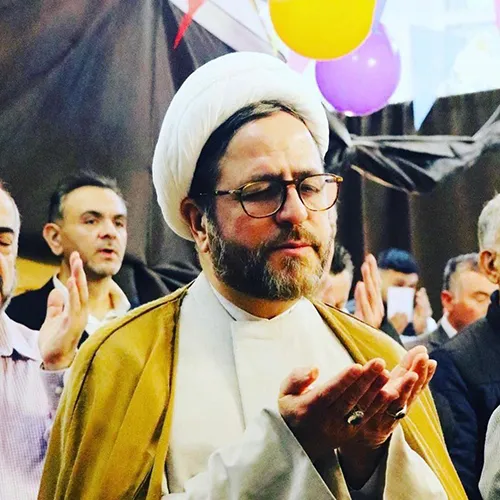Hujjat al-Islam Mollah Abbasi
This week’s bulletin takes us to the beautiful region of Wales, which claims to be the location of the first mosque in Britain. Although evidence suggests that the Woking Mosque in London was the first active mosque in Britain, some official sources attribute the registration of the first mosque in Britain to 1860, located in the Cottis district of Wales. According to local sources, the people of Wales have extended the warmest welcome to Muslims. Cardiff, the capital of Wales, is one of the four regions of Britain where Shia centres have been holding Friday prayers since 2005. Of course, Wales also has other Friday prayers, and Hujjat al-Islam Mollah Abbasi, the Imam of Imam Ali Centre in Cardiff, with his relatively long-standing experience, can best introduce us to this religious and social hub in Wales.
- Could you please introduce your Friday prayers and other Friday prayers in Wales?
First, I must express my sincere gratitude for your attention to the important matter of the Friday prayer, which is both a spiritual and social ritual. Unfortunately, sometimes we overlook the best opportunities and noble traditional platforms, and search for illusions in other people’s fields, while we have the tools and opportunities at hand, yet we neglect them. Indeed, as the Quran and the teachings of the infallible (peace be upon them) clearly state, the Friday prayer and its cultural, spiritual, social, and political benefits for the individual and society are not insignificant or untrustworthy. They are so full of blessings and outcomes that until a person experiences them firsthand, they cannot fully understand the material and spiritual joys. However, I will limit myself to saying that the Quran commands us to spread out on the earth after the Friday prayer, to remember God often, and to perhaps find success and salvation. The success and salvation from the remembrance of God and the Friday prayer are, in fact, the ultimate outcomes of all the religious, moral, and doctrinal teachings for the faithful, leading to success in both this world and the hereafter, which is highly valuable. This is something I wanted to introduce as an introduction. The Friday prayer in Cardiff has a relatively long history, starting in 2005, initially held by Sheikh Mohammad Al-Attiyah. After his transfer to London, I was appointed as the Imam of the Friday prayer from 2006, based on the decree of the grand religious authorities or their representatives in London, and by the grace of God, it continues to this day. In other cities of Wales, Friday prayers are also held, such as in Newport and Swansea.
- What is the status of Muslims in Wales, and how is the relationship between the people of this region and Muslims?
Muslims in Wales hold an important position compared to other Muslims in other parts of the UK because the first mosque built in Britain, where the Friday prayer was first held, was in Cardiff, the capital of Wales. This is the first point. The second point is that the people of the region have a positive and respectful attitude towards Muslims. They view Muslims with respect because they are more educated, cultured, and occupy a higher status than other minorities in the country.
- What are the consequences of an Imam not being up to date?
The first consequence of an Imam not being up to date is the detachment of Muslims from the mosque and prayer. Being aware of world events and the realities of society, and offering scientific, religious, and Qur’anic guidance in every field, can help attract people to the prayer. Since many major media outlets are influenced by those opposed to faith and divine reason, the Imam must be up to date in order to neutralize the harmful and biased news and narratives through Qur’anic and religious analysis. For example, during the war against the people of Gaza, it was the Friday prayer platform that provided the opportunity for maximum participation in protest gatherings against the genocide of the oppressed Palestinian people in the past year.
- How essential is the use of modern media in advancing the goals of an Imam?
God encourages us in the Quran to use the tools and means of the time, saying: “And strive towards Him with means.” The most important tool at present is the mass media, which should be used according to the conditions and situations to further religious goals. However, the negative consequences of using modern media cannot be ignored. Nowadays, media have become a double-edged sword, meaning that it might not always be possible to convey the content or message in its true and intended religious and valuable meaning, especially with how content is manipulated or truncated in social media to serve malicious purposes.
- Informing people about “domestic and global issues and the needs and realities of society” is an essential content requirement for sermons. Can you provide examples of these realities in the current situation?
Today, preserving and safeguarding the beliefs and thoughts of Muslims and the faithful congregants is one of the most essential duties of mosques, Friday prayers, and congregational gatherings. Principles such as preserving the unity of the followers of Ahl al-Bayt (peace be upon them) and other Muslims, fostering a spirit of empathy and solidarity, and deepening religious and doctrinal foundations are very important. If the faithful listen to the Imam’s up to date and meaningful sermons regularly, they will feel a pure and sincere spirit in their souls and beliefs every week. Examples of internal issues include analysing the UK education system and the impact of sexual education, how to address division and conspiracies against Muslims in the present time, and so on.
editor's pick
news via inbox
Subscribe to the newsletter.




